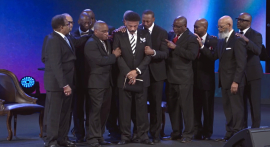
Dr. Zurlo and Mandryk discuss the diverse evangelical movement shifting to the Global South, where it is now mainly African, Asian, and Latin American, no longer centered in the West.
The September 2 webinar was hosted by the World Evangelical Alliance and released to the public on September 5. Both experts agree that, unlike Catholicism, Orthodoxy, or Pentecostalism, evangelicalism lacks a universally accepted definition.
Mandryk states that the word 'Evangelical' has multiple meanings depending on the context. Within churches, it may signify commitments to Scripture, personal conversion, and evangelistic activism. In secular settings, especially in Western media and politics, it’s often used pejoratively, evoking images of anti-science attitudes, stubbornness, or partisanship.
“Virtually nobody is using it exactly the same way,” Mandryk said. “And most people aren’t bothering to try to understand how others are using it.”
Zurlo echoes this point, noting that while “you know what a Catholic is, or a Presbyterian, or a Pentecostal,” the term Evangelical remains “squishy.”
“Christianity and evangelicalism look fundamentally different than they did a generation ago,” she said. “And each generation it changes — especially with the shift of Christianity to the Global South.”
Mandryk emphasizes that evangelicalism has been one of the most influential forces shaping Christianity in recent history, for better and for worse. Its global reach has unified Christians in mission and prayer, but also divided them through disputes over doctrine, politics and culture.
For Operation World, historian David Bebbington’s influential description of evangelicalism—known as the Bebbington Quadrilateral—serves as the starting point, with an estimate of over 700 million Evangelicals worldwide.
The World Christian Database, instead of using theological definitions, applies social-scientific categories to “wider evangelicalism,” and estimates there are 937 million Evangelicals worldwide—nearly one in eight people on Earth.
While Operation World and the World Christian Database employ different approaches, both reach the same overarching conclusion: evangelicalism is no longer centered in the West.
Mandryk notes that by around 1980, Evangelicals had already become a majority in the Global South. Today, 70% of the world’s population is born into a reality where evangelicalism is predominantly African, Asian, and Latin American.
“The stereotypes that dominate headlines — white, Western, English-speaking, politically conservative — are not what evangelicalism looks like globally,” he said. “Evangelicals are Zulu, Chinese, Brazilian, Filipino. And that diversity is something to celebrate.”
Zurlo’s data reinforces this point, revealing that in her broadest definition, 47% of evangelicals are in Africa, 26% in Asia, and only 11% in North America. She states that the country with the largest evangelical population is no longer the United States but China.
“It’s not people who look like me who should be defining the identity markers of Evangelical belief and practice,” Zurlo said. “It’s Asians, Africans, Latin Americans, and islanders who now represent the demographic center of the movement.”
Mandryk shares this perspective, emphasizing that the diversity within evangelicalism mirrors that of the global Church. “The body of Christ is incredibly diverse,” he said. “Evangelicalism is equally diverse in geography, theology and practice. That is something to embrace.”
When asked about the number of evangelicals, Zurlo estimates it ranges between 393 million and 937 million, depending on how the term is defined. She admits that the wide range may be unsatisfying, but it reflects the reality of a movement that resists simple categorization.
For Mandryk, the precise number is less important than what the diversity represents. “All of these numbers are just attempts by researchers to describe what God is actually doing on the ground,” he said.
Both agree that evangelicalism should be seen less as a fixed category and more as a dynamic, global family united by shared qualities rather than rigid definitions. “Global evangelicalism is more diverse than you think,” Zurlo concluded. “And yet we can all find our place in it. That’s its strength, not its weakness.”



















